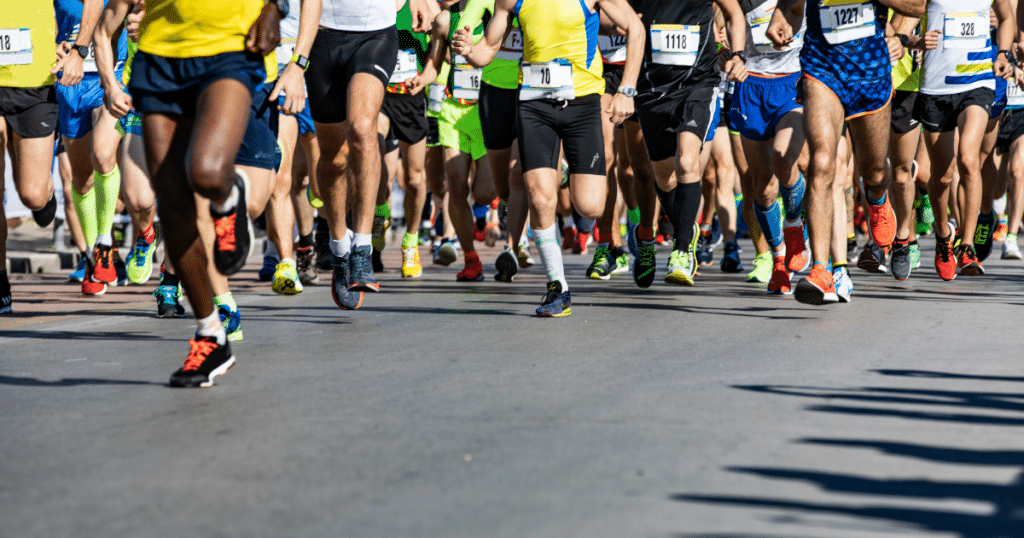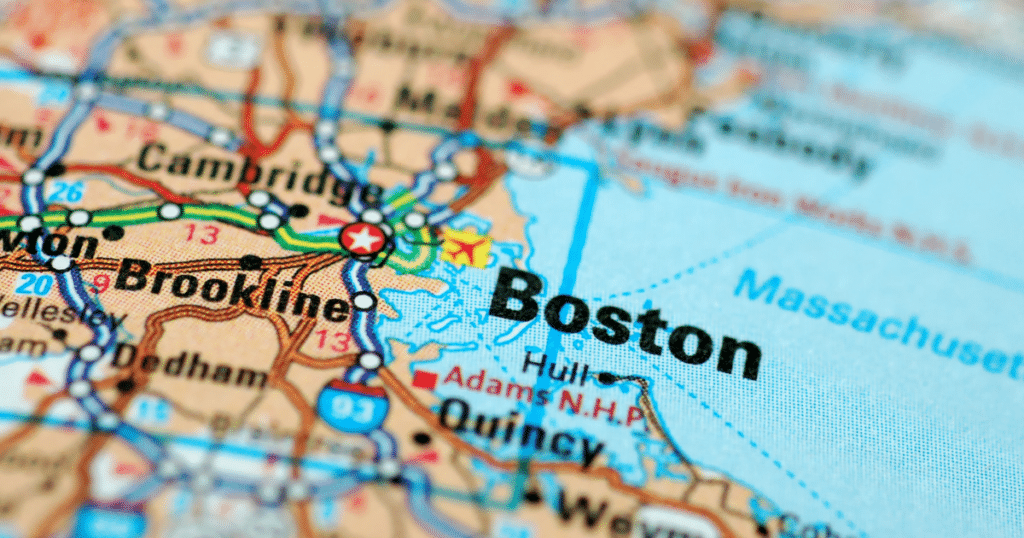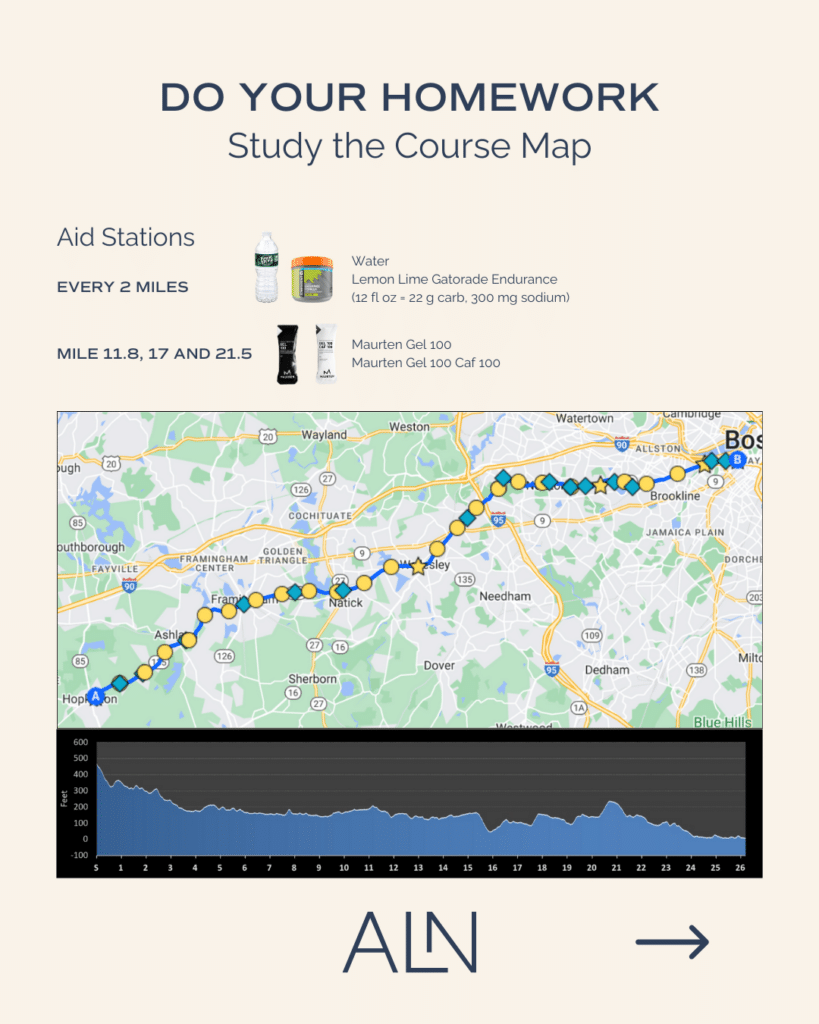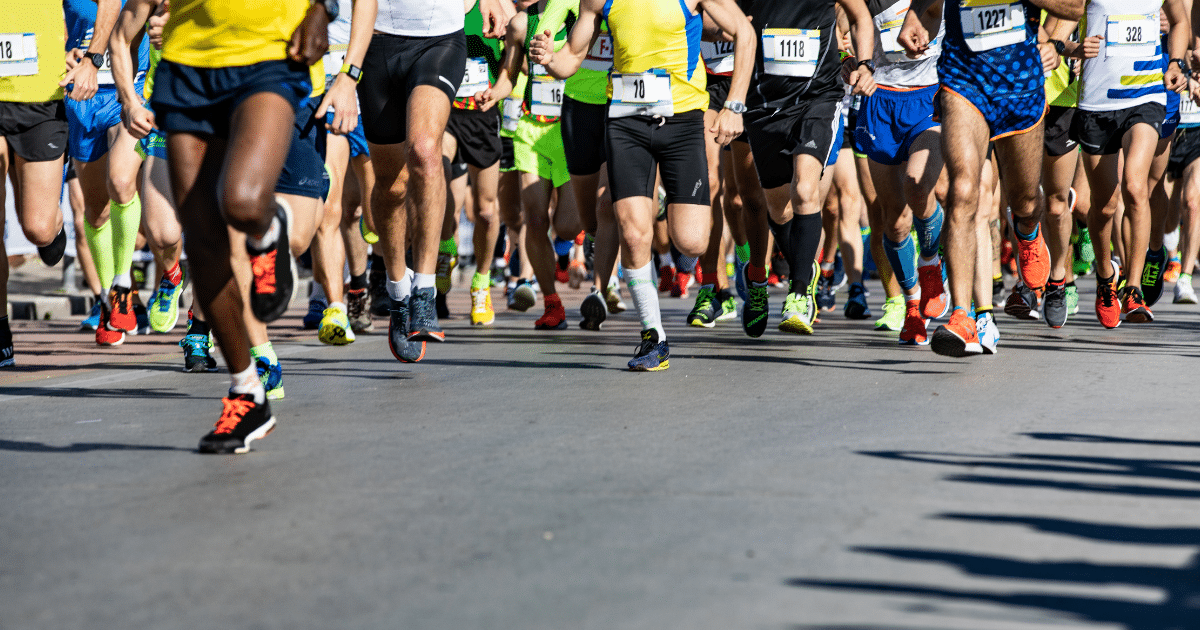RUNNING →
Level Up Your Nutrition Game With Our Freebies
Alex
I provide nutrition coaching for endurance athletes to improve performance and body composition through a simple and flexible eating style.
Hi, I'm
ATHLETE EATING GUIDE →
PROTEIN →
TRIATHLON →
RECIPES →
PERFORMANCE NUTRITION →
SUPPLEMENTS →
HOLIDAY & TRAVEL →
PLANT-BASED →
FEMALE ATHLETE NUTRITION
Explore the Blog
LEARN MORE →
ATHLETE GROCERY SHOPPING GUIDE →
RACE DAY: TRIATHLON NUTRITION PLANNER →
READY TO FUEL?
incredible value!
The fueling guide bundle serves as your one-stop-shop for strategies to fueling before, during and after your workouts.
ENDURANCE EATS
BINGE-WATCH READY!
YOUTUBE SERIES
While racing a marathon of this magnitude can be wildly overwhelming, it doesn’t need to be with the right planning. I’ve said it before and I will say it again, even for the best-intentioned and most-practiced athletes, nutrition can make or break your race. To achieve the utmost confidence, trialing a nutrition plan tailored to your individualized needs is key to a successful race. We won’t let Heartbreak Hill break our hearts this year. Let’s review several key Boston Marathon tips so you are confident and well-fueled on race day.
The Importance of Nutrition in Marathon Success

Nutrition plays a pivotal role in marathon success, fueling endurance runners through rigorous training and race day challenges. Carb loading, your pre-race meals, adequate race-day fueling, and recovery are just several key considerations heading into the Boston Marathon.
Ultimately, nutrition is the cornerstone of marathon achievement, sustaining athletes for the long haul. Fortunately, my team and I have put together several key considerations that will take the nutrition prep work for the Boston Marathon off of your plate.
Boston Marathon Tips: Building Your Nutrition Plan
I have worked with countless athletes who have had the most dialed-in training cycle but unfortunately have fallen short of their race-day goals due to poor nutrition. We want to keep you off of the sidelines. Building a solid nutrition foundation for the Boston Marathon is crucial for peak performance.
Carb Loading and Other Pre-Race Considerations
What you eat before race day is arguably just as critical as what you eat during the race. Carb loading is an important strategy for runners to use so they are adequately fueled heading into a big race including Boston. Some research shows as much as a 2-3% increase in performance following a high carbohydrate intake.
Eating carb-rich foods before race day can help maximize your glycogen stores, your source of stored energy. On the flip side, inadequate glycogen stores on race day can lead to unnecessary fatigue and decreased endurance– when you least want it– heading up Heartbreak Hill. To avoid this, many endurance athletes use carb loading to increase the amount of glycogen stored in their muscles and liver. These extra glycogen stores can convert into increased stamina and endurance for your upcoming race or big training session.
Carb-loading involves consuming higher amounts of carbs than normal approximately 1-3 days before the race starts. If this sounds daunting, don’t worry, we have a whole carb-loading guide post for you! As you get race-ready, consider planning your carb load and these suggestions may make access to carbs a lot easier:
- Pack and plan ahead of time! Easy-to-pack high-carb foods include: bagels, bread, tortillas, crackers, pretzels, dried fruit or fruit leather, cereals, microwavable rice or noodle packets, and the delicious list goes on. Fortunately, these quick and convenient carbs will safely make it through TSA if you are flying.
- Make a grocery store or market haul for your carb-load favorites. There are countless grocery store options in Downtown Boston including Whole Foods, Star Market, and Trader Joe’s, among several others. If you have limited transportation access, consider a ride share or even grocery delivery for convenience.
- Do your research if you are dining out. If you are comfortable with dining out as part of your carb load, consider a large serving of fettuccine (drop the alfredo sauce) at Maggiano’s or Giacomo’s Ristorante. Save the raw shellfish indulgence at The Oceanaire Seafood Room for after the race. Other convenient quick-casual restaurants include Chipotle, Noodles & Co, and Panera Bread.
Boston Marathon Tips: What to Eat The Evening Before

The evening before race day is not the time to start experimenting with new exotic foods. If your training buddies invite you to an all-you-can-eat oysters at Neptune Oyster, it is best to politely decline and offer a safer alternative. While there are many food-related principles to stick with before race day, for most individuals, it is generally best to limit high-fiber foods such as fruits, vegetables, and whole grains. These foods can increase gassiness, bloating, and diarrhea. This is even more so important if you are more prone to unwanted gastrointestinal issues. High-fat and high-protein foods should also be decreased so that you can maximize carbohydrate intake in your carbohydrate-loading plan.
Similar to carb loading, consider experimenting with your standard pre-race meal on the evenings before your longest long runs to ensure your body tolerates the meal. This will help increase confidence in your food choices heading into race day. A carbohydrate-rich meal that is lower in fat and fiber with extra salt is typically best to focus on. Here are a few examples of what to eat the night before a marathon:
- Vegetarian sushi with soy sauce, an extra side of white rice, and an applesauce pouch. Applesauce pouches are a lower-fiber alternative to fresh apple slices.
- Baked salmon with salted boiled potatoes and banana slices. Teriyaki or soy sauce are great high-sodium flavorings to jazz up this dish.
- Grilled chicken tacos with corn tortillas and an extra side of white rice. Remember to pass on the side of refried beans!
- If traveling: microwavable noodle bowl with a side of pita bread and a large glass of lemonade.
Boston Marathon Tips: Race Day Considerations
While you may be stressing over many variables heading into Marathon Monday, nutrition will not be one of them. However, it is important to research race day logistics ahead of time so you well-prepared. Most Boston marathon runners do not start the race until 10:00 am (ET) however bus loading begins in downtown Boston much before then at 6:45 am (ET). This means that with the delayed start, you will need more than one breakfast to fuel those miles ahead.
Breakfasts of Champions
Examples of convenient and quick carb-rich breakfasts to fuel those miles include:
- Cream of rice cereal with maple syrup and Skratch hydration beverage
- Toast with salted almond butter and honey and Tailwind hydration beverage
- If traveling- brown sugar oatmeal packet with an applesauce pouch and Maurten 320 drink mix
- If you are eating hotel breakfast- a low-fiber bagel with peanut butter and jelly, a banana, and a glass of orange juice
Ideally, you want to consume a carb-rich breakfast before loading the bus and also consider packing another breakfast for the lengthy bus ride to Hopkinton. Yes, take this as permission to enjoy two breakfasts. You can also utilize sports hydration beverages or gels instead of your second meal. This is something that you should experiment with in training so that you feel confident eating this additional volume on race day.
Per Boston Athletic Association (BAA), drop bags need to be dropped before loading the bus. So whatever items that you tote with you on the bus transportation you need to be okay with never seeing again. The only bag allowed on the bus is the gallon-size bag that your bib was distributed in at packet pick-up.
I typically encourage marathoners to pack an extra water bottle with a sports hydration mix, an extra gel, and a few snacks such as animal crackers, dry cereal, or pretzels to munch on. If you are not planning on carrying a bag on the bus, these items can be easily stored in your “toss-away” clothes.
Intra-Race Fueling Strategies and Hydration Tips
Adequate practice and preparation are key for what to eat during a marathon. Ideally, you have practiced this on most, if not every, long run throughout your marathon training cycle. For most runners, the recommendation is to aim for 60-90g of carbohydrates per hour, 200-500mg of sodium per hour, and 5-10oz of fluids every 15 minutes during the race. Simple carbohydrates such as energy gels, and sports drink beverages are the most convenient options for hitting these nutrition goals.
Keep an eye on the weather forecast in the week before the race. Be prepared to adjust your race fueling and hydration strategy! You can read more on how to do so HERE!
Study the Boston Marathon Race Course
BAA notes that water and Lemon Lime Gatorade Endurance will be served at every aid station along the course, beginning at mile 2. In addition, Maurten gels will be served at miles 11.8, mile 17, and also at mile 21.5. Both Maurten’s Gel 100 and Gel 100 CAF 100 will be available. If you have not practiced with these nutrition products in training, start now if you anticipate using them on race day. If not, stick with your individualized race-day nutrition plan that you have practiced and have the utmost confidence in.
Evaluate the race course. Be familiar with the turns and elevation gains and losses. With the Boston Marathon course, the first half is fairly downhill with some rollers. Take advantage of this by fueling consistently well. Then when you get to the hilly section between miles 16-21 you’ll have plenty of gas in the tank to feel strong through that challenging 5-mile stretch. Fortunately, you’ll be able to grab more fuel at mile 21.5 after Heartbreak Hill to help you finish strong.

Post-Boston Marathon: Recovery Nutrition
Congratulations, you made it to the historic finish! When your race ends, recovery begins! According to the Boston Marathon website, you can use the provided clear drawstring bag (18″x19″) with a 5″ gusseted bottom labeled on one side as your finish area gear bag. You will have had to drop this in the drop-bag area before you get on the shuttle bus. If you don’t want to rely on the post-race snacks you can pack your own in the drop bag.
The importance of recovery increases as the frequency, duration, and intensity of your race increases. Boston Marathon is certainly no exception to that rule. Ideally include:
Protein and Carbohydrates
Refuel within 30 minutes of finishing the race and include a lean protein and high-glycemic carbohydrate-rich food to jump-start recovery. Delaying your carbohydrate intake by even 2 hours can slow down the replenishment process. 3:1-4:1 (carbohydrate to protein ratio) is typically recommended for optimal muscle tissue recovery after a harder effort.
Athletes should aim to include 0.5-0.7g of carbohydrate per pound of body weight within finishing the race. Chocolate milk, a protein drink with a peanut butter and jelly sandwich, or even a protein bar with dry cereal are all good examples of post-race recovery nutrition options. You then also want to eat a full meal within 2-4 hours of finishing the race. Enjoy an extra-large burger at Mike & Patty’s or the Saltie Girl.
Fluids fluids fluids
Rehydration must be a top priority after a hard race as athletes tend to replace only ½ or ¾ of their sweat losses through drinking during exercise. In general, you want to aim for 20-24 oz of fluid for every pound lost.
Remember to take advantage of beverages that have calories, carbohydrates, and electrolytes such as sports hydration beverages. Also remember that thirst is not always a reliable indicator of fluid losses, in fact tends to be a very late predictor of fluid needs. Also, a liquid meal can take the place of solid nutrition if you are feeling any sort of stomach upset.
Electrolytes
Electrolyte imbalances often occur after harder, prolonged bouts of exercise. This can result in unwanted side effects including chronic cramping, headaches, confusion, and even nausea and vomiting. Endurance athletes can replenish their electrolytes in a few ways.
Two of the most popular are electrolyte powders and sports drinks. Electrolyte powders are mixes that you can add straight to your water bottle. Some include all four electrolytes (sodium, potassium, calcium, and magnesium) and others may only contain specific ones such as sodium.
Feeling Confident Heading into Race Day
Each athlete has very unique nutrition needs and it is important that you feel just as confident in your fueling plan as you do with your training and racing plan. Nailing down your Boston Marathon fueling plan requires consistent practice and patience, which can be the hardest part! It’s not too late to get race-ready working with a sports dietitian so that you can better tailor a marathon fueling strategy that works for you!
Alex
I provide nutrition coaching for endurance athletes to improve performance and body composition through a simple and flexible eating style.
Hi, I'm
LEARN MORE →
take the quiz!
Let's discover your Endurance Nutrition IQ
How well do you know your fueling? Answer these questions and let's see where your endurance nutrition knowledge is at!
Take the quiz
level up your nutrition game with these freebies
free downloadS
Protein-Packed 10-Day Sample Meal Plan
Athlete Eating Guide
Athlete Grocery Shopping Guide
1
2
3
Inspiration to fit 120 grams of protein into your day
Planning what goes on your plate
Putting the right foods in your grocery cart
